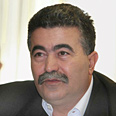
IDF on ceasefire: Next few hours critical
Defense minister orders IDF to be vigilant and ensure ceasefire with Palestinian groups is not breached accidentally; army fears ceasefire will be used to rearm, smuggle sophisticated weapons
The security establishment is trying to perceive the ceasefire as a base for serious talks with the Palestinians about the fate of kidnapped soldier Gilad Shalit.
But the security establishment warily received news that Palestinian groups agreed to a ceasefire. Officials said military pressure applied on armed groups in Gaza and the killing of 400 gunmen since the June 25 kidnapping of Shalit forced terror groups to agree to the ceasefire.
But some military officials fear that terror groups will bank of Israel halting its military incursions to rearm.
"No doubt we need to be aware of the strengthening of terror groups, the armament and the weapons. But decisions are not taken in the military field. We will accept the decisions of the political echelon as to how to act," said a military source.
The IDF is awaiting instructions from the political echelon, particularly regarding situations in gunmen are spotted approaching the security fence or roaming the Beit Hanoun area with what may appear to be a Qassam rocket on their shoulders. It remains unclear whether aircraft are authorized to open fire at terrorist cells transporting rockets from caches in Beit Hanoun to Jabalya, where explosives and metal balls are placed in them.
In talks with military commanders, Defense Minister Amir Peretz ordered the IDF to be extra vigilant in order to avoid making mistakes that could breach the ceasefire. The IDF withdrew troops from the Gaza Strip and soldiers were ordered to respond to Palestinian attacks only when in life threatening situations.
"All fire attempts into Israeli territory will be counted as a breach of the ceasefire and will dealt with severely," Peretz said. "If Abu Mazen (President Mahmoud Abbas) and his associates in the ceasefire are unable to impose the ceasefire on the factions, Israel will see in that a violation of the ceasefire and will act to protect its citizens," he said.
Political echelon should make decisions
Israel Defense Forces Chief of Staff Lit.-Gen. Dan Halutz and Southern Command Chief Maj.-Gen. Yoav Galant, hinted recently that Israel needs to act against terror groups in Gaza in order to prevent them from becoming as strong and sophisticated as Hizbullah.
The army knows the chances of the government approving a large-scale operation in the Gaza Strip are slim, but some believe "those are important questions that the political echelon will need to answer."
A senior reserve officer told Ynet: "It is forbidden to be dazed by the short term and ignore the long term. There are no unilateral agreements, it seems that Israel is adopting agreements in which it has no part and on which it has no influence."










